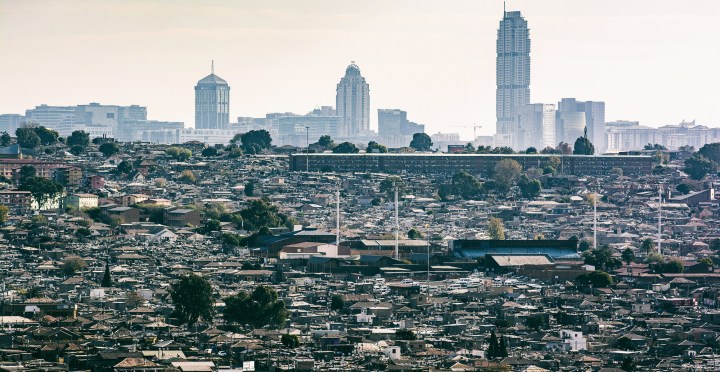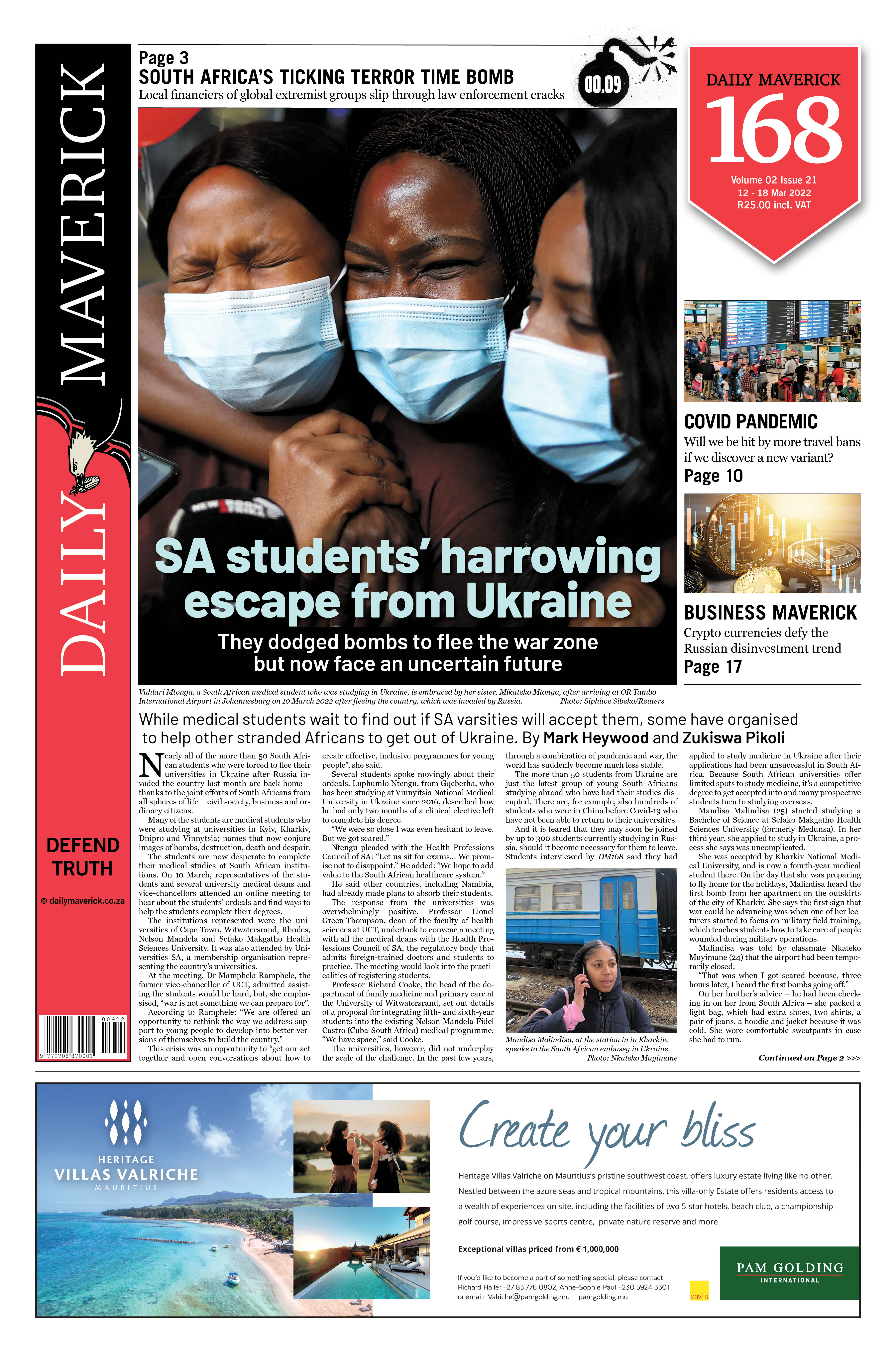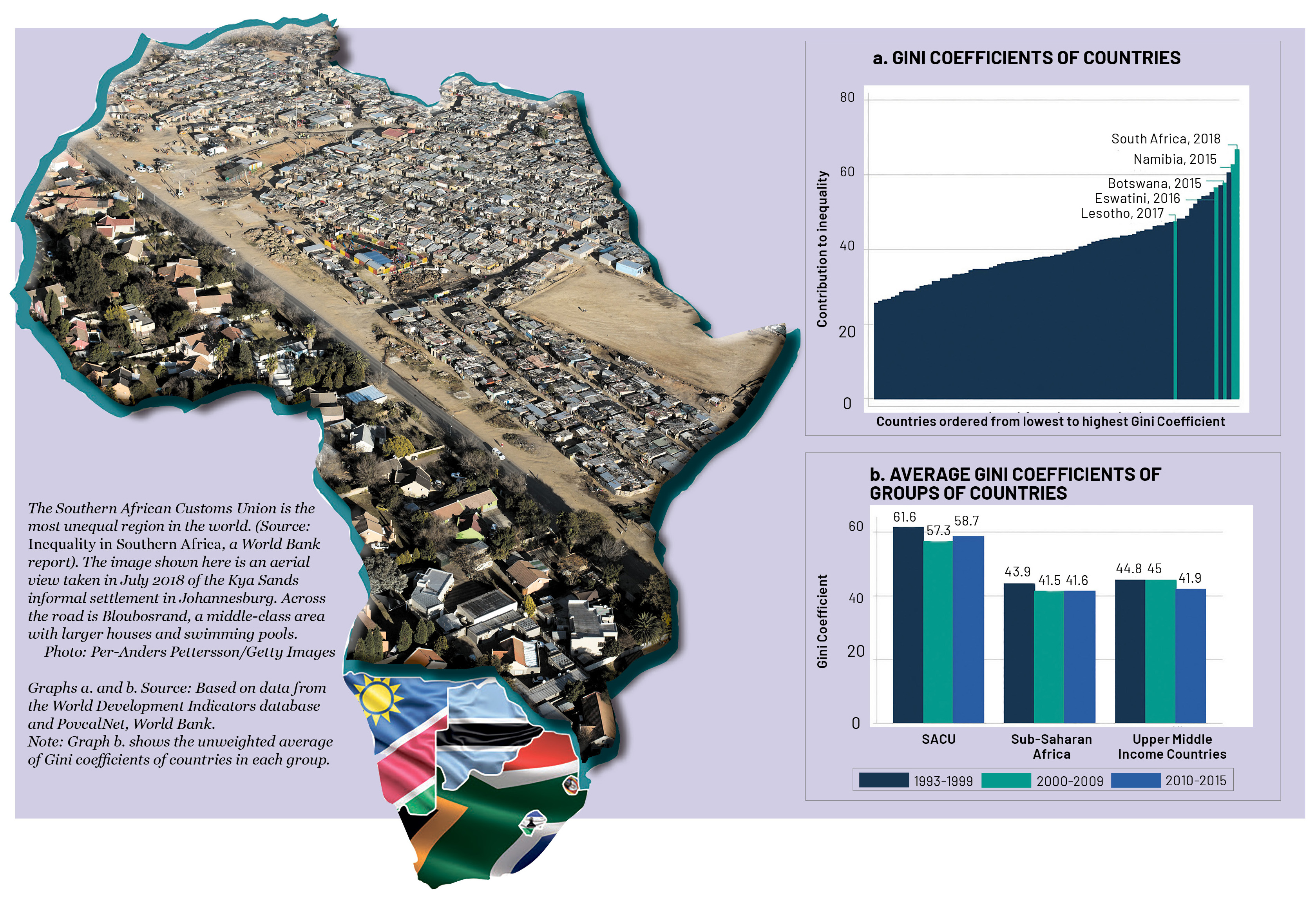ECONOMIC OUTLOOK
South Africa the world’s most unequal country – World Bank report

And the award for the most unequal country in the world goes to … drum roll … South Africa – again.
South Africa has once again topped the global charts on a dismal economic measurement. According to a new report by the World Bank, Inequality in Southern Africa, the rainbow nation is still the world’s most unequal country.
This is deeply distressing and goes a long way towards explaining a host of social ills, including high levels of unrest, a sky-high unemployment rate, rampant crime and a population that is far hungrier, sicker and poorly educated than it has ever been.
“The Southern African Customs Union [Sacu], comprising Botswana, Eswatini, Lesotho, Namibia and South Africa, is the world’s most unequal region.
“Based on Gini coefficients of consumption (or income) per capita, South Africa, the largest country in Sacu, is the most unequal country in the world, ranking first among 164 countries in the World Bank’s global poverty database,” says the report, which was released on 9 March.
The Gini coefficient is the main measure of disparities in income and consumption, with zero being perfect equality and 1 or 100% representing perfect inequality. South Africa’s score is well north of 60.
The report cites a number of factors behind this state of affairs. None of them comes as a surprise but their persistence is downright depressing and they stand as an indictment of almost three decades of ANC misrule and shoddy governance.
“Inequality of opportunity” is one that is cited and that’s a no-brainer. If you grow up in a squatter camp and your single parent has little in the way of education, your prospects of going to medical school are clearly far lower than that of a child with two university-educated parents who attends a top private school. The ANC has dropped the ball on this front by, among other things, failing to provide proper public schools and competent, literate teachers from the taxes the government has raised.
A proper public education system can help to bridge the gap, but one cannot be erected if the government is on a looting spree.
“[H]igh spending does not always mean high-quality services. Although investment in pre-tertiary education and health in Sacu is highly progressive, the quality of these services remains relatively low,” the report says in a classic case of diplomatic understatement.
One upshot has been a shortage of skilled labour, which has seen its wages rise, while the glut of semiskilled and unskilled labour has stagnated the wages of such workers.
“Location” is another factor that is noted.
“Factors associated with where people are born and grow up have a relatively larger effect on their life chances than their gender,” the report says.
The shadows of colonialism and apartheid also loom large in the World Bank’s assessment. “In South Africa, the legacy of colonialism and apartheid, rooted in racial and spatial segregation, continues to reinforce inequality of outcomes,” it says.
Enduring disparities of land ownership – which the ANC has also failed to rectify – get a mention.
This is catnip for the Radical Economic Transformation faction of the ANC, whose plundering and squandering of state resources has contributed in no small measure to persistent inequalities. Apartheid’s iniquitous legacy was never going to be resolved overnight, but the ANC has done little to resolve it. It has, in fact, in many ways perpetuated it.
The report makes some sensible policy proposals to help to reduce inequality, such as “improving the efficiency and inclusivity of public service delivery”. Again, the ANC has completely messed this one up.
Boosting the provision of early childhood development services is another. This also falls into the no-brainer category and one can imagine useless conferences and the like being devoted to the issue.
“Many people in [Sacu] still live far from job opportunities and have limited access to basic services, because of both the legacy of apartheid and poor spatial planning and development,” the report also says, drawing the obvious conclusion that this must be addressed. That requires a functioning public rail service and other working modes of public transport. But SA has “Mr Fix It” in charge of this, and early childhood initiatives are a bit late to bring him up to scratch, but who knows? Send him back to preschool and he may come out top of the class.
Strengthening land rights is another obvious proposal that emerges from this report. But that would dilute the power of the chiefs – a key ANC political base – in the apartheid relics of rural poverty that are the former homelands, so good luck with that.
From the perspective of business – the sector of society that South African President Cyril Ramaphosa recently said “creates jobs” – there are also a handful of proposals that have been proposed for years by, well, the business community.
To that end, the report calls for “improving business environments through reducing business regulations that hamper domestic and foreign investment and through strengthening competition and productivity, for example by investing in the digital economy and building domestic technical skills; [and] boosting entrepreneurship, self-employment and small business development by removing regulatory bottlenecks, supporting business and socio-emotional skills development, and expanding access to finance”.
A critic or a cynic might ask: What about economic growth?
The narrative from business is generally that higher rates of economic growth are needed to create jobs and reduce poverty and, as a result, cut inequality or at least soften its harder edges. It must be said that economic growth alone does not magically generate jobs. South Africa’s economic rebound with gross domestic product growth of 4.9% last year coincided with record unemployment – a case of “jobless growth”, some might say. But without economic growth, it is hard to see how employment levels can rise.
The report frames the issue in the other direction, noting that inequality impedes both growth and its benefits.
“When inequality of opportunity is high, economic growth is less likely to help reduce inequality of outcomes. Instead, unequal outcomes tend to become entrenched; this … limits the investment opportunities available to poor people and hampers long-term growth,” it says. “High inequality of opportunity tends to reduce social mobility, which … contributes to the persistence of income inequality and slower economic growth.
“As households in disadvantaged groups suffer larger, longer-lasting shocks, they are also more prone to adopting coping mechanisms that lead to a loss of productivity and lower consumption in the longer run… This may increase inequality in the accumulation of human and physical capital, causing social mobility and economic growth to decline and income inequality to worsen over time, unless policies are put in place to mitigate the long-lasting impacts of the crisis.”
This is kind of a chicken-and-egg question – what comes first, economic growth or reduced inequality? – but the broader point is that the pair reflect each other in complicated ways.
Clearly, just getting the basics right helps, such as keeping the lights on, for starters. This correspondent typed this paragraph as his diesel generator rumbled in the nocturnal background. The students who board in the house next door were forced to sit in the dark, disrupting their studies and widening the “inequality of opportunity” that exists between us. They aspire to the middle class, but their road there is riddled with the gaping potholes of a failing state. DM168
This story first appeared in our weekly Daily Maverick 168 newspaper which is available for R25 at Pick n Pay, Exclusive Books and airport bookstores. For your nearest stockist, please click here.






















 Become an Insider
Become an Insider
Comments - Please login in order to comment.